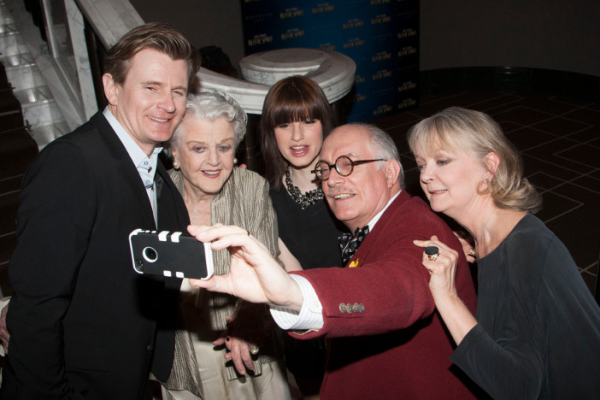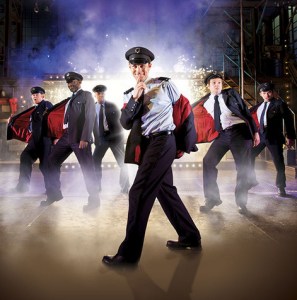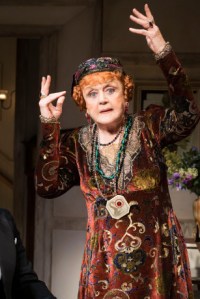Michael Coveney: Theatreland indulges in a Noel Coward mini-binge
Noel Coward is having something of a moment, writes our chief critic

© Dan Wooller for WhatsOnStage
We've embarked on another Noel Coward mini-binge, heralded by last night's opening of Blithe Spirit at the Gielgud. I've already mentioned my psychic premonitions in Naples of next week's Eduardo De Filippo play at the Barbican, but I tuned into Noel Coward, too, on my day trip to Capri, when we made the steep descent from the main square to the Marina Piccola. Or, as Coward calls it in one of his funniest songs, the Piccola Marina, "where Life called to Mrs Wentworth-Brewster."
Blithe Spirit restores Angela Lansbury in full glory to the London stage as the happy medium Madame Arcati, and her free-wheeling delight in ectoplasmic manifestations conveys something of the sensual release Mrs Wentorth-Brewster finds in the "rather queer unfamiliar atmosphere" of the Mediterranean islet.
Well, it's a far cry from Woking, where she's left her dead husband in the family vault in pursuit of fun and fishermen. One of the latter was sitting stitching his nets by the bar, and certainly looked old and grizzled enough to have been one of the young blades who cried "viva viva" and "Che regazza" when she sat in the grand piazza. The memory of it all seemed to have stunned him into glazed silence.
"Just for fun, three young sailors from Messina bowed low to Mrs Wentworth-Brewster, said 'Scusi' and politely goosed her; then there was quite a scena…" Oh, what larks in the Piccola Marina. Coward got the idea for the song while staying on Capri and watching "hordes of middle-aged matrons pouring off every boat, all set to have themselves a ball."
Madame Arcati would not have been with them, of course; she, like the playwright, is the transforming catalyst of dullness and conformity in others, and Lansbury's elegant superiority in the role – a far cry indeed from Margaret Rutherford's jowl-shaking dottiness in the movie, or Penelope Keith's suburban bossiness, or indeed Alison Steadman's no-nonsense, scout-mistressy bustling about (both Keith and Steadman were directed onstage by Thea Sharrock) – moves Arcati into another glamorous dimension.
She doesn't have any music, apart from the record player accompaniment to her strange spirit-summoning dance, but director Michael Blakemore has chopped up the scenes with some very well recorded snippets (excellent sound, incidentally, by Ben and Max Ringham) of Coward songs sung by Christine Ebersole, accompanied by Lawrence Yurman, some well known, some not so.
The main song, though, is Irving Berlin's plangent "I'll be seeing you, always" ("with a love that's true, always"), which no doubt prompted Coward's comedy of transparent love through a curtain not only of recrimination but death itself, too. The Coward songs include "I'll See You Again," from Bitter-Sweet, and other less familiar, equally well-chosen ditties that might have been listed in the programme but aren't, unfortunately.
Blithe Spirit itself seems hardly to have been away from our stage since it ended its record-breaking four-and-a-half year run at the end of the war. Maria Aitken, Joanna Lumley and Ruthie Henshall have all played Elvira, and on Broadway Geraldine Page received a Tony nomination as Madame Arcati before dying (though not on stage) during the run. The craziest of all Arcatis was Dora Bryan, the grandest undoubtedly Elizabeth Spriggs, and now Lansbury is the funniest.
A much later, and less well known Coward play, Relative Values, is coming up soon in Trevor Nunn's Theatre Royal, Bath production at the Harold Pinter. The poster advertising makes it look like a spin-off from Downton Abbey, which is clever, I suppose, as the play is about a cultural clash between Hollywood "new" values and the starchy British aristocracy. Twenty years ago there was a very good revival by Deborah Paige at the Salisbury Playhouse, followed by an awful one – with Susan Hampshire and Margaret Courtenay – at the Savoy, which had been renovated after a fire and two or three years of closure.
Relative Values, like Nude With Violin, both dating from the 1950s, is thought of as one of those Coward plays where the writer's reactionary conservatism gets the better of him (which it doesn't, usually); it ends with a toast to "the final inglorious disintegration of the most unlikely dream that ever troubled the foolish heart of man – Social Equality."
It will be interesting to see how Nunn negotiates that brain-numbing teaser. Almost as interesting, perhaps, as seeing how Blanche McIntyre justifies her claim that Coward's collection of nine one-act plays Tonight at 8.30 is "a lost masterpiece: a celebration of writing and acting that builds to become a manifesto on how to live. The breadth of Coward's vision and the depth of his humanity are staggering."
Phew! McIntyre's staging of this revue-style nonet – "No, No, Nonet"? – the first time the piece has been seen in its entirety at one go since 1936, is a co-production between the re-branded Nuffield in Southampton and English Touring Theatre. The plays are divided into three triple bills – Cocktails, Dinner and Dancing – and open at the end of next month. I can hardly wait.














